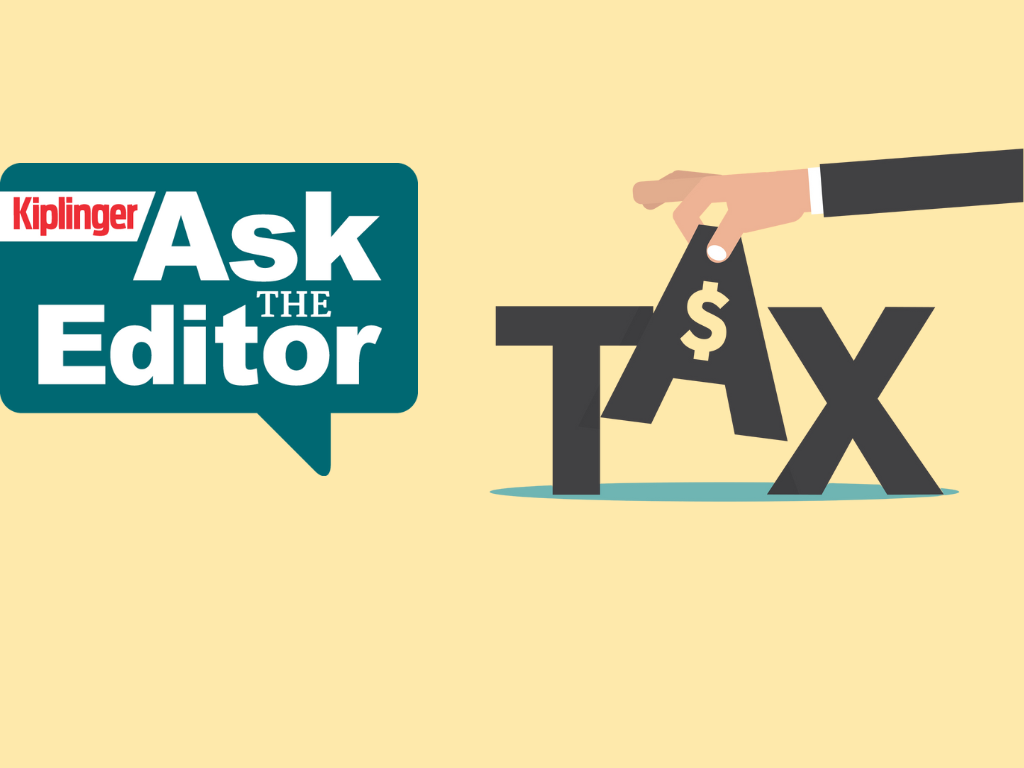Ask the Editor, August 1: Tax Questions on Standard Deductions
In our latest Ask the Editor round-up, Joy Taylor, The Kiplinger Tax Letter Editor, answers four questions on claiming standard deductions.

Profit and prosper with the best of Kiplinger's advice on investing, taxes, retirement, personal finance and much more. Delivered daily. Enter your email in the box and click Sign Me Up.
You are now subscribed
Your newsletter sign-up was successful
Want to add more newsletters?

Delivered daily
Kiplinger Today
Profit and prosper with the best of Kiplinger's advice on investing, taxes, retirement, personal finance and much more delivered daily. Smart money moves start here.

Sent five days a week
Kiplinger A Step Ahead
Get practical help to make better financial decisions in your everyday life, from spending to savings on top deals.

Delivered daily
Kiplinger Closing Bell
Get today's biggest financial and investing headlines delivered to your inbox every day the U.S. stock market is open.

Sent twice a week
Kiplinger Adviser Intel
Financial pros across the country share best practices and fresh tactics to preserve and grow your wealth.

Delivered weekly
Kiplinger Tax Tips
Trim your federal and state tax bills with practical tax-planning and tax-cutting strategies.

Sent twice a week
Kiplinger Retirement Tips
Your twice-a-week guide to planning and enjoying a financially secure and richly rewarding retirement

Sent bimonthly.
Kiplinger Adviser Angle
Insights for advisers, wealth managers and other financial professionals.

Sent twice a week
Kiplinger Investing Weekly
Your twice-a-week roundup of promising stocks, funds, companies and industries you should consider, ones you should avoid, and why.

Sent weekly for six weeks
Kiplinger Invest for Retirement
Your step-by-step six-part series on how to invest for retirement, from devising a successful strategy to exactly which investments to choose.
Each week, in our Ask the Editor series, Joy Taylor, The Kiplinger Tax Letter Editor, answers questions on topics submitted by readers. This week, she’s looking at questions on claiming standard deductions on your tax return. (Get a free issue of The Kiplinger Tax Letter or subscribe.)
1. What are the new amounts for 2025?
Question: Did the “One Big Beautiful Bill” (OBBB) make any changes to standard deductions?
Joy Taylor: Yes, the 2017 Tax Cuts and Jobs Act nearly doubled the standard deduction amounts, but only on a temporary basis through the end of 2025. The recently enacted OBBB not only made permanent the 2017 enhancements to the standard deduction but also further increased the amounts. Beginning with 2025 tax returns that taxpayers file next year, standard deduction amounts increase by $1,500 for joint filers, $750 for single filers and $1,125 for head-of-household filers. For 2025 returns, the standard deductions are:
- $31,500 for joint filers (plus $1,600 for each spouse 65 or older)
- $15,750 for single filers (plus $2,000 if 65 or older)
- $23,625 for head-of-household filers (plus $2,000 if 65 or older)
- $15,750 for married-filing-separately filers (plus $2,000 if 65 or older)
- Blind people get an extra $1,600 on joint returns and $2,000 on single or head-of-household returns
2. Can I claim the $6,000 senior deduction?
Question: I am married, and my spouse and I are both over age 65. We don’t itemize on Schedule A of the Form 1040. Can we claim the new $6,000 senior deduction and the standard deduction on our 2025 Form 1040?
From just $107.88 $24.99 for Kiplinger Personal Finance
Become a smarter, better informed investor. Subscribe from just $107.88 $24.99, plus get up to 4 Special Issues

Sign up for Kiplinger’s Free Newsletters
Profit and prosper with the best of expert advice on investing, taxes, retirement, personal finance and more - straight to your e-mail.
Profit and prosper with the best of expert advice - straight to your e-mail.
Joy Taylor: Yes, provided that your modified adjusted income doesn’t exceed the threshold for claiming the senior deduction. The OBBB provides for a new senior tax deduction of $6,000 per filer age 65 and older. Married couples with both spouses 65 and older can deduct $12,000 on a joint return. This deduction is available to taxpayers who claim the standard deduction and to those who itemize on Schedule A of the Form 1040 or 1040-SR. This is a temporary write-off, first taking effect on 2025 tax returns that you file next year and ending after 2028.
Not every senior qualifies. The deduction begins to phase out at modified adjusted gross incomes (or modified AGI) above $150,000 on joint returns and $75,000 on single and head-of-household returns. The deduction is fully phased out once modified AGI reaches $175,000 for single and head-of-household filers and $250,000 for joint filers. Modified AGI for this purpose is AGI plus any foreign earned income exclusion, foreign housing exclusion, and any amounts excluded from gross income because they were received from sources in Puerto Rico or American Samoa. Also, each eligible spouse must have a Social Security number to claim this write-off.
On your 2025 jointly filed Form 1040, you will be able to claim the standard deduction of $34,700 ($31,500 plus $3,200 since both of you are 65 or older) and, provided your modified AGI doesn’t exceed the monetary thresholds discussed above, the $12,000 senior deduction ($6,000 for each of you since you are both 65 or older).
3. Is there an income threshold for standard deductions?
Question: I know there is a modified AGI threshold for determining eligibility for the new $6,000 senior deduction. Is there a similar limitation for claiming standard deductions?
Joy Taylor: No. In answer 2 above, I explained that the senior deduction begins to phase out at modified AGI above $150,000 on joint returns and $75,000 on single and head-of-household returns. The standard deductions are not subject to a modified AGI threshold. So upper-income taxpayers can claim standard deductions without worrying about the write-off being phased out based on income levels.
4. Itemizing on Schedule A
Question: I always itemize deductions on Schedule A when I file my Form 1040. Can I also claim the higher standard deduction for 2025?
Joy Taylor: No. You cannot take the standard deduction if you are itemizing deductions on Schedule A. It’s an either/or situation – either you claim the standard deduction OR you itemize deductions on Schedule A. You can’t do both.
About Ask the Editor, Tax Edition
Subscribers of The Kiplinger Tax Letter and The Kiplinger Letter can ask Joy questions about tax topics. You'll find full details of how to submit questions in The Kiplinger Tax Letter and The Kiplinger Letter. (Subscribe to The Kiplinger Tax Letter or The Kiplinger Letter.)
We have already received many questions from readers on tax changes in the OBBB. In this column, we have addressed questions on changes to standard deductions. We will answer more queries on the OBBB in future Ask the Editor round-ups. So keep those questions coming!
Not all questions submitted will be published, and some may be condensed and/or combined with other similar questions and answers, as required editorially. The answers provided by our editors and experts, in this Q&A series, are for general informational purposes only. While we take reasonable precautions to ensure we provide accurate answers to your questions, this information does not and is not intended to, constitute independent financial, legal, or tax advice. You should not act, or refrain from acting, based on any information provided in this feature. You should consult with a financial or tax advisor regarding any questions you may have in relation to the matters discussed in this article.
More Reader Questions Answered
- Ask the Editor: Questions on the new tax law
- Ask the Editor: Questions on tax deductions and IRAs
- Ask the Editor: Questions on home sales and taxes
- Ask the Editor: Questions on Inherited IRAs
- Ask the Editor: Questions on capital gains
Profit and prosper with the best of Kiplinger's advice on investing, taxes, retirement, personal finance and much more. Delivered daily. Enter your email in the box and click Sign Me Up.

Joy is an experienced CPA and tax attorney with an L.L.M. in Taxation from New York University School of Law. After many years working for big law and accounting firms, Joy saw the light and now puts her education, legal experience and in-depth knowledge of federal tax law to use writing for Kiplinger. She writes and edits The Kiplinger Tax Letter and contributes federal tax and retirement stories to kiplinger.com and Kiplinger’s Retirement Report. Her articles have been picked up by the Washington Post and other media outlets. Joy has also appeared as a tax expert in newspapers, on television and on radio discussing federal tax developments.
-
 Nasdaq Leads a Rocky Risk-On Rally: Stock Market Today
Nasdaq Leads a Rocky Risk-On Rally: Stock Market TodayAnother worrying bout of late-session weakness couldn't take down the main equity indexes on Wednesday.
-
 Quiz: Do You Know How to Avoid the "Medigap Trap?"
Quiz: Do You Know How to Avoid the "Medigap Trap?"Quiz Test your basic knowledge of the "Medigap Trap" in our quick quiz.
-
 5 Top Tax-Efficient Mutual Funds for Smarter Investing
5 Top Tax-Efficient Mutual Funds for Smarter InvestingMutual funds are many things, but "tax-friendly" usually isn't one of them. These are the exceptions.
-
 Ask the Editor, February 13: More Questions on IRAs
Ask the Editor, February 13: More Questions on IRAsAsk the Editor In this week's Ask the Editor Q&A, Joy Taylor answers questions on IRAs
-
 How to Open Your Kid's $1,000 Trump Account
How to Open Your Kid's $1,000 Trump AccountTax Breaks Filing income taxes in 2026? You won't want to miss Form 4547 to claim a $1,000 Trump Account for your child.
-
 7 Bad Tax Habits to Kick Right Now
7 Bad Tax Habits to Kick Right NowTax Tips Ditch these seven common habits to sidestep IRS red flags for a smoother, faster 2026 income tax filing.
-
 Ask the Editor, February 6: Questions on Federal Income Tax Deductions
Ask the Editor, February 6: Questions on Federal Income Tax DeductionsAsk the Editor In this week's Ask the Editor Q&A, Joy Taylor answers questions on federal income tax deductions
-
 Should You Do Your Own Taxes This Year or Hire a Pro?
Should You Do Your Own Taxes This Year or Hire a Pro?Taxes Doing your own taxes isn’t easy, and hiring a tax pro isn’t cheap. Here’s a guide to help you figure out whether to tackle the job on your own or hire a professional.
-
 Ask the Editor, January 30: Questions on Social Security Benefits Taxation
Ask the Editor, January 30: Questions on Social Security Benefits TaxationAsk the Editor In this week's Ask the Editor Q&A, Joy Taylor answers questions on the taxation of Social Security benefits
-
 Don't Overpay the IRS: 6 Tax Mistakes That Could Be Raising Your Bill
Don't Overpay the IRS: 6 Tax Mistakes That Could Be Raising Your BillTax Tips Is your income tax bill bigger than expected? Here's how you should prepare for next year.
-
 Will IRS Budget Cuts Disrupt Tax Season? What You Need to Know
Will IRS Budget Cuts Disrupt Tax Season? What You Need to KnowTaxes The 2026 tax season could be an unprecedented one for the IRS. Here’s how you can be proactive to keep up with the status of your return.